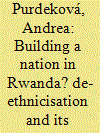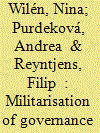| Srl | Item |
| 1 |
ID:
085159


|
|
|
|
|
| Publication |
2008.
|
| Summary/Abstract |
Rwanda remains in the eastern camp of ethnic ideas and projects of a 'nation' inasmuch as it is dominated by cultural as opposed to civic/political elements. Although the Rwandan attempt remains exclusive internally, it does not affirm the validity of an idealised Kohnian dichotomy between 'exclusive' ethnic nationalism and 'inclusive' civic nationalism. To avoid the trap of a bi-polar and value-ladden division, while preserving the useful insights of Kohn, the paper calls for a re-conceptualisation of nation-building projects along the continuum of their relative inclusiveness/exclusiveness, both internally (who shapes the 'idea of nation') and externally (the boundaries of nation).
|
|
|
|
|
|
|
|
|
|
|
|
|
|
|
|
| 2 |
ID:
189027


|
|
|
|
|
| Summary/Abstract |
Rectification as the return of sites of violence to prior use is little studied even as governments often defiantly reconstruct such sites and urge citizens to visit them as a way to combat ‘terror’. Using the case study of the 2013 Westgate shopping mall attack in Kenya and the subsequent return of the site to prior use, the article reflects on the broader practices of erasure of violence from public space as a unique form of a memory–security nexus. The article reads amnesia and its effects through material and social practices of rectification – renovation, fortification, closure and reopening, and the experiences of survivors and non-survivors in reinhabiting these spaces. The ways in which violence is vacated from space and speech, and the ways in which its absence is encountered by diverse people, produce a rich transcript on memory and its entanglements with security agendas. They also reveal the deleterious effects of politicized ‘triumphalist amnesia’ enlisted as a counter-terror tool, including the emotional tax and public distrust arising from non-recognition when memory is equated with vulnerability and forgetting with defiance. Triumphalist amnesia might produce the opposite effect – a failure to root out violence and insecurity among those asked to confront it.
|
|
|
|
|
|
|
|
|
|
|
|
|
|
|
|
| 3 |
ID:
157715


|
|
|
|
|
| Summary/Abstract |
In this article, we develop and expand the rebel-to-ruler literature to go beyond ‘rebel transformations’, in order to examine the transformation and militarisation of the entire post-genocide society in Rwanda. Through a historical and socio-political analysis of the military’s influence in post-genocide Rwanda, we argue that the adoption of military norms and ethos, drawn from an idealised and reconstructed pre-colonial history rather than simply an insurgent past, motivates the military’s centrality and penetration of all society’s sectors, economically, politically and socially, with the ultimate aim of retaining power in the hands of the rebels turned rulers. As such, the case demonstrates the need for an expansion of the rebel-to-ruler literature (1) beyond its concern with parties and regime type to a broader palette of governance effects and (2) beyond its singular focus on insurgent past and towards a longue-durée understanding of complementary causes
|
|
|
|
|
|
|
|
|
|
|
|
|
|
|
|